Radioinactive
Place : Le Triptyque, Paris, France

Hip-Hop Core: Let's talk a little bit about your last album, Soundtrack To A Book. What did you want to do with this album? Is it the self-producted project that you were talking about two years ago?
Radioinactive: Yes. I teamed up with MidiMe, who's from an analog rock background, and I would take the rough sketches on the MPC. We had a big board Quad-Eight mic preamp, a Roland S-50 and all the old analog gear, a Teletronix LA2A leveling amplifier, a DBX, all the old stuff that made the sixties, seventies and eighties albums really pop. I was in search of the lo-fi but in a more upgraded way… It was cool, everything we did by accident, I was trying to technically figure out how to do it and I had the help of MidiMe. He was very creative with recording techniques and we did all types of complicated things. The production details are all available on Stranger Touch website (hwww.strangertouchrecords.com). It's kinda like "geeky" analog techniques, where the process becomes technically creative. You have different compressors compressing everything individually, etc…
HHC: What made you want to go for that analog and more rock sound, that is different and a little bit dirtier that on Free Kamal for instance?
R: It's just an evolution, everyone goes through different discoveries. At first, you are completely reckless and abandoned: you just record, you don't know anything about levels and everything, you are just sort of very intuitive. Then people tell you all kind of audio advice stuff like you have to make sure that the isolation is complete by having your headphones low and all that stuff.
Then, cut to, a friend of mine had got the whole Frank Sinatra catalog to remix. He was listening to Al Green sessions. A lot of the magic on the old records is from the bleed: that you hear the drums on the vocals and mic… It's this sort of contamination that makes it beautiful. And a lot of times in the digital, I think we lost track of that, the beauty we had with the bleeding and the intermingling of everything, like hearing sounds in the background of the recording… That's what happens when you start pulling out all those records that sound great.
A lot of the stuff that is produced now is too pretty and some of the truth is removed from the dirty, because as we all know, life, no matter how good it is, it isn't all that pretty and slick. So people can relate to a little bit dirtier sounds.
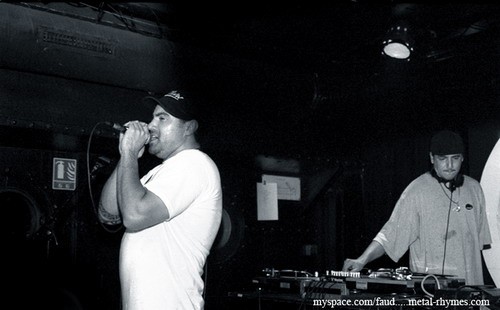
HHC: Compared to your previous albums, the last one seems to translate in an easier way on stage. The tracks are more appealing and direct. Is that something that you intended and how did you accomplish it?
R: When you're young and rebellious, you have a tendency to be very over the top with everything, like you say "I don't go to the movies because I don't want to support political values or superpowers and all that shit" You're very militant about everything. But I think as an art form we can take away all the borders of "this is industrial-tech hip-hop for people from the eastern block" and "this is that". When you remove all the boundaries and frontiers, everybody has their evolution or de-evolution.
For me, it was discovering some of the composition. You can be as abstract as you want, but you're in 4/4 time and your bars are all 8-bar chorus and 4-bar verse… Sometimes, it becomes too symetrical and too perfect, so that it doesn't create any tension and everything is just too predictable. So I began to explore by listening to old psych-rock and pop records and studying the format. I was trying to get as creative as with that as with the words and ideas. I think that it's more subconscious: certain formats open up people… it's just a matter of organisation.
HHC: What about Gideon Zaretsky aka MidiMe? What was exactly his involvement in the album?
R: It's interesting but being a hip hop producer means something completely different than like a producer on a rock record. It has a different connotation. But the thing is, I would make the beat program and I would come with a sample, and then he would help me realize a bigger version of it, like we would play live instruments over the sample. And for instance, I would have Gideon play live drums exactly the same pattern as I programmed, then we would have programmed drums to one side and real drums to the other. So we would work on the changes, making them more interesting, creating core-product progressions and stuff like that. We sort of elaborated on the ideas and made them more complete. My aim was to appeal to musicality and to people who like all types of music…
HHC: Where did you get the idea of using those old samplers and recorders from the beginning of the eighties?
R: That's a good question! It's sort of a secret but if you were to do research, you will find that it's a puzzle that needs to be solved. There are certain hints on the record towards finding out why we did what we did. But I think it's better to have some mystery than just to spell everything out. It's part of the rubic's cube of the whole thing!
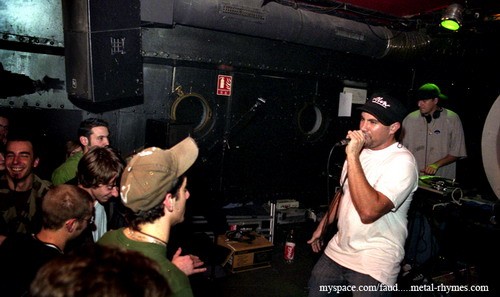
HHC: It seems that sometimes you try to mix all your lyrics down into something quite difficult to comprehend or decypher, like in 'Radiator' where you used all kinds of sound effects. What made you want to use such sound effects? And doesn't it disturb you that some people might lose the meaning of your words in the process?
R: I first got the idea for these sound effects from the sixties folk singer Donovan's song 'Hurdy Gurdy Man', where I think he uses that Leslie amplifier that spins around and does this effect [the voice vibrating and oscillating]. So when I first did the song, I was just playing around with my voice to make this kind of sound… because it was all about using the voice as an instrument. The lyrics are available on websites for people who really want to know. The rythm, that's what rap is all about in my opinion. Sometimes I rap fast, sometimes I rap backwards or whatever, making it difficult to understand in one way. This one is different in another way, but because the voice is coming and going, it's forcing your imagination to fill in the blanks. Our brains operate this way, when we view things, we view them backwards, upside down and in black and white. By the time, the information gets to our cerebral cortex, we are perceiving with our brains four billion pieces of information per second, but we're only recognizing three thousands bits of information… So our minds are always filling in the blanks about what we think is supposed to be there.
HHC: Is it something like melting the meaning with the shape of things?
R: I think so, yes. The voice becomes musical so there's a point where it doesn't matter, if you understand but at the same time, whether you like it or not, your subconscious is always taking in the information and processing it. It's like listening to a subliminal tape, and you wake up in the morning and then all of a sudden you know how to speak French!
HHC: That's something that's always been prevalent in your music. But why using sound effects this time around? I mean it wasn't so much the case on your previous albums.
R: There are various sound effects, other than just voice effects, throughout the album, like these found sounds to create an ambiance and have your ears interact in different ways. There is a lot of exploration in effects. We didn't just put in an effect and bla-bla-bla and that was it. For instance, for 'Radiator', Gideon had this idea to take a small microphone and a wireless RF transmitter and to tape them to the blade of a ceiling fan. So I was holding up a speaker with my voice as the fan was spinning around. We adjusted the speed and then we put the result to analog tape and listened to it. And then we adjusted the speed again until we managed to get the effect that we wanted. We were trying to create a reverse Leslie effect. And it doesn't matter if the people never find out how we do it but that's how we did it.

HHC: It seems that you're eager to create new sounds and to constantly find a new approach to doing music…
R: Hip-hop, they get a reputation of sampling and just taking things, but we were trying to create something more and different than what has been done before. If you look at the sticker for the album with the robot, this is an 8-track interactive robot where you push the buttons for different answers and what not. And I consider this album as an analog interactive robot. It's like an early eighties version of how you would think a robot would talk, before we had the Episode II Star Wars version.
HHC: What made you want to do produce the whole album in the first place?
R: For one, no one was running to me. I've always had a hard time rapping over my own beats, because I get drained doing one thing and then you don't have any energy to write the raps… I just wanted to step up the game in other aspects where I don't think we have in the past… Although Free Kamal was really well thought-out and AntiMC did all types of stuff rough to get to where we got in that record, where do you go from there? Do you do the same type of thing?
I was like a kid with all these different pieces of equipment that this guy has spent thousands and thousands of dollars for years collecting. The Quad-Eight console was owned by the evangelist Oral Roberts a long time ago, so it was just sitting there, collecting dust and I decided to spark it up. When I would record vocals, we would have six or seven mics, Sony tube mics and all the stuff that I never had the luxury of being able to use. I was just trying to get back to certain elements from the past that we like about the old records we listen to, but I was also trying not to make a pseudo-retro thing. Trying to combine the future and the past, and to go somewhere else.
And there's another reason… In the early nineties, I knew one person maybe who had a 4-track, one person who had an SP-12, and we would all ride the bus to meet him and record at their place. But now we live in an age where every kid at your show has a computer and can create a CD on that. So how do you make the distinction? I also wanted to let people know that you don't have to be limited to zeros and ones. Even if nothing digital is bad, it doesn't end there, you can combine computers with everything. We had all the analog stuff and we had the Pro Tools Mix Plus.
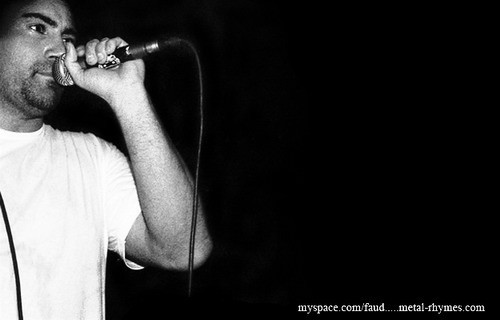
HHC: Could you tell us a few words about Stranger Touch Records? How did you end up being there after your Mush contract? What made you want to create your own label?
R: Just for the record, A Stranger Touch is when you walk behind someone and they don't know it and you touch your head to their back. So the idea of this name came from a weird game that you and your friends can play, but it's like the trivial interconnections that people may have… it's just sort of goofy.
Being on a label like Mush where everything gets done, I was sort of illusioned. You just think that your record gets made and then the distributor buys it and then it's in the stores and all the people buy it… But a label is a lot of work! I used to work in a record store when I was eighteen. And I didn't think that I was important, even though I was one of those people that sell your record. But there's this interaction between the artist, the distributor, the label, the digital download and everything that you might not realize. But only now I realize the importance of everyone and all the interactions in the record industry. You have to adapt yourself to such a changing world.
HHC: How does it feel being on the other side now, producing records when you used to sell them?
R: There's so many musicians that work at record stores and that are actually world famous and now they have no money because they got debts, because it's not easy to make money being an artist. It's a vicious circle, you may be on top and then you might be back selling records again.
HHC: How did you end up working with Eliott Lipp for this album?
R: I met Eliott Lipp through Subtitle and Leo123. He gave me a track. Actually, there's a little bit of a problem because I made the track a long time ago and then he gave the instrumental for another record. So we worked the track, remixed it and added different elements to it that weren't there. But the label was trying to tell that they owned this and bla-bla-bla… So Eliott had to tell them the real deal.
HHC: At one point you were up to a project with Institubes and people in France. What's up with that?
R: I'm still open to it. I think it's just a question of money and scheduling… but I'd love to do that. I know Exist came here and recorded a bunch of songs and I think they're trying to put it out.
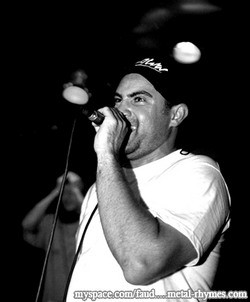 HHC: What are you working on these days and what do you plan to do in the next months?
HHC: What are you working on these days and what do you plan to do in the next months?
R: I'm on tour and hopefully I'll make some music with dDamage and maybe TTC as I'm in France for three weeks. And I am doing production sound and mixing for a documentary across the Sahara, so from december to february I will be in Niger, Lybia and Egypt. There's three people and they're attempting to run through across the Sahara, fifty miles a day for eighty days (more information on www.nationalgeographic.com) and I'm going to be there with them, capturing the sound in all the villages. The director has an academy award for another documentary and this one is produced by Matt Damon and Ben Affleck's company… I'm hoping also that I can get to record some original sounds there.
HHC: So you're not doing music on this film?
R: Well, a friend of mine is actually doing some of the score for the movie and Bono from U2 is also involved, he's doing a song with Will.I.am from the Black Eyed Peas. Hopefully, my friend is going to help me to be on the soundtrack!
HHC: Is this movie linked to the NGOs 'Drop The Debt' action?
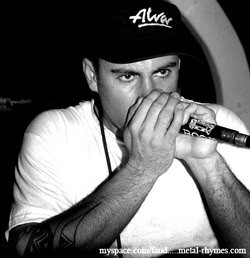 R: It's all about water, the lack of water… These guys are running but everywhere they're coming to contact with this problem, where they have to travel half a day to find water and then it's not clean…
R: It's all about water, the lack of water… These guys are running but everywhere they're coming to contact with this problem, where they have to travel half a day to find water and then it's not clean…
HHC: Are you eager to be there?
R: Yes, I think it's great. I'll take some material (my MPC-500, the battery powered one, a digital 4-track, a 8-track and my clarinette) and I'm gonna try to write and to record a lot of music in my spare time… cause I'm gonna have a lot of time where I'm gonna be in the desert in Sahara. Artistically, it's more about moving out of the confort zone. Plus I can maybe discover some of my roots going through that part of the world which I've haven't been to (nota: Radioinactive has egyptians origins).
HHC: Do you have a sound engineer background?
R: I've been doing sound for TV and movies over the years to supplement my rap money. I worked on 'Sword Fish', the movie with Halle Berry… I did a lot of bad reality shows! This year I did Survivor in the Cook Islands and also American Idol. It's so interesting the irony of being around these people who want to be in the limelight!, while I'm doing underground music… It's like the Peter Parker type of thing, I have this other life that a lot of people don't know about. But it's kinda cool, I like it that way. You can be on the side and just be laughing all the way…
HHC: What are your rap projects?
R: I've been working with Joe Dub, the producer that just did the last Ellay Khule's album. He's making the kind of beats that he wants to hear me rapping over, like some more old school-type stuff. You don't have to always be trying to do something so creative, it's so decadent! So I'm like, shit! Just back to the basics : samples, beats, raps, scratches. Back to the essence of it. I think it's important. If you can do all these things at once, as an artist you'll feel like you're not pigeon-holed and you're doing everything you want to do.
HHC: Subtitle told us that on tour he was often spending all his hotel nights writing songs. Are you always inspired on tour?
R: When you tour, you figure out what you want to do live. It has an effect on you. You can see very well what works for you on stage and what doesn't work, so it inspires you to make more stuff.
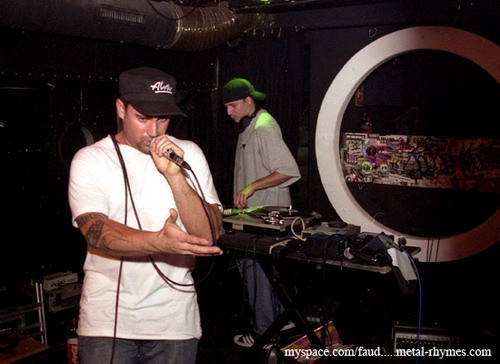
HHC: Could you tell us a few words about your work with 24/7 Records on the Tropiczone Swap compilation?
R: With Bobby Dollars, yes. That was cool. They contacted me via email, told me about the "Amphibious Swap" project and said that they didn't really have any money to give me but that it was gonna be cool and I said: "why not?" We're all trying to make money, but sometimes investing your time and your lyrics to get somewhere else is just even better than like make some money and just go spend it. So they sent some files and I did my part and sent them back… We did everything on the web.
There's some great artists coming out of Sweden but I haven't been able to do an official show there. It's sort of strange, because they have all these artists… In Finland they really like the underground stuff but in Sweden I think the majority of the public prefers more traditional boom-bap stuff. I did an interview in Sweden with this guy named Matts something who interviewed everyone from Aretha Franklin and Al Green to 50 Cent but he just knows everything!
HHC: What is exactly your link to Los Angeles? How does it show in your lyrics?
R: Los Angeles is a sprawling metropolis, it's very spread-out, it's more of a district than a city maybe. Everyone drives cars, you're not interacting with people on a very close basis so you can be very much in your own world, whereas in New York everyone is living on top of each other. In New York, you can be different but you sorta have to be in a certain pocket because you're so around your peers all the time, that it's a cooperative kind of thing. In LA, the underground scene is very small but there are some kind of people that are up on it. It affords you to be isolated and surrounded by lots of people at the same time, so it's a good place to try to get into your own sound.
There were a lot of trend setters in the LA underground, that started a lot of things, but you really have to come with something different to stick out. I think it was Sesquipedalien (who's on 'Una Cosa' on "Pyramidi", he's one of the first guys I met at the Good Life Cafe) that was telling me a long long time ago: "You have to do something that only you can do". He would be rapping in Spanish, backwards, he would be talking about surfing because he lived in the South Bay… No one from South Central could talk about stuff like that because they weren't mexican and they didn't live by the beach. So you have to put your individual stamp on things, something that no one can really copy.
So L.A. is always gonna be there. Where you're from is always going to be with you but travelling is definitely important. There's so many people and places to see and inspiration to get. Even in music, I'll always encourage people not to listen to just hip hop because they're going to be influenced by it. If you want to rap about anything, go listen to some other music from some other time and then the influence will be more subtle and it will be more interesting. You have to remain open.
Interview by Cobalt & Billyjack
January 2007